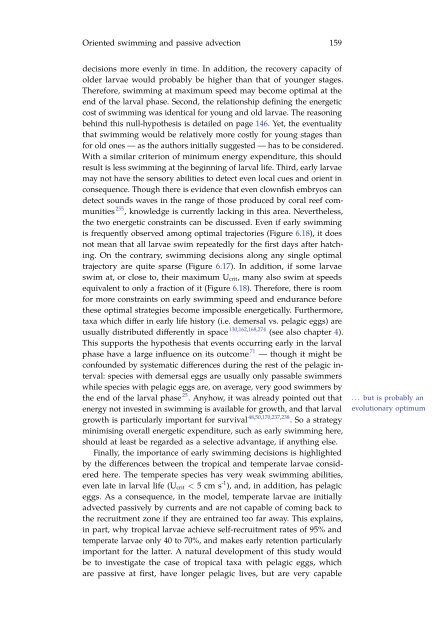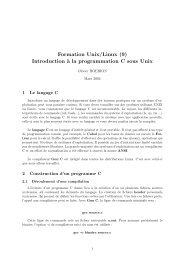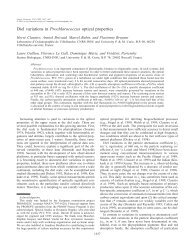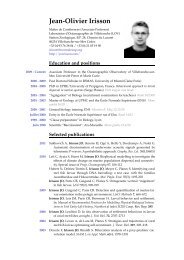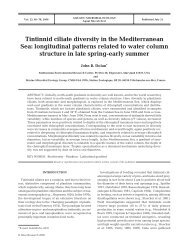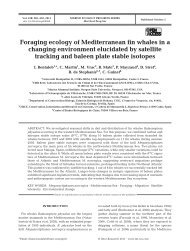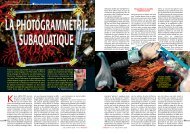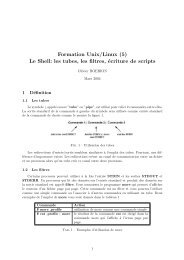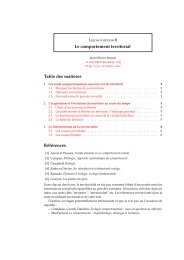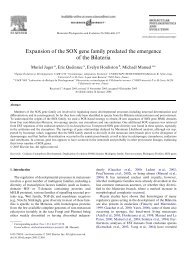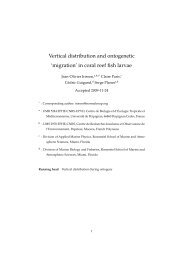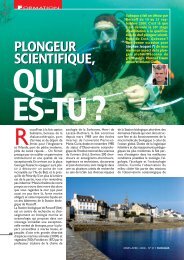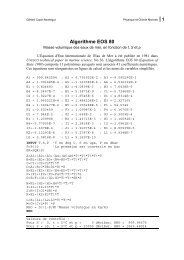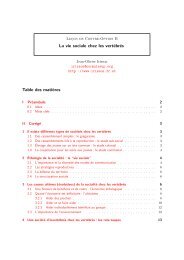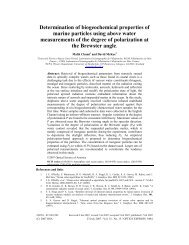Dissertation - HQ
Dissertation - HQ
Dissertation - HQ
You also want an ePaper? Increase the reach of your titles
YUMPU automatically turns print PDFs into web optimized ePapers that Google loves.
Oriented swimming and passive advection 159<br />
decisions more evenly in time. In addition, the recovery capacity of<br />
older larvae would probably be higher than that of younger stages.<br />
Therefore, swimming at maximum speed may become optimal at the<br />
end of the larval phase. Second, the relationship defining the energetic<br />
cost of swimming was identical for young and old larvae. The reasoning<br />
behind this null-hypothesis is detailed on page 146. Yet, the eventuality<br />
that swimming would be relatively more costly for young stages than<br />
for old ones — as the authors initially suggested — has to be considered.<br />
With a similar criterion of minimum energy expenditure, this should<br />
result is less swimming at the beginning of larval life. Third, early larvae<br />
may not have the sensory abilities to detect even local cues and orient in<br />
consequence. Though there is evidence that even clownfish embryos can<br />
detect sounds waves in the range of those produced by coral reef communities<br />
255 , knowledge is currently lacking in this area. Nevertheless,<br />
the two energetic constraints can be discussed. Even if early swimming<br />
is frequently observed among optimal trajectories (Figure 6.18), it does<br />
not mean that all larvae swim repeatedly for the first days after hatching.<br />
On the contrary, swimming decisions along any single optimal<br />
trajectory are quite sparse (Figure 6.17). In addition, if some larvae<br />
swim at, or close to, their maximum U crit, many also swim at speeds<br />
equivalent to only a fraction of it (Figure 6.18). Therefore, there is room<br />
for more constraints on early swimming speed and endurance before<br />
these optimal strategies become impossible energetically. Furthermore,<br />
taxa which differ in early life history (i.e. demersal vs. pelagic eggs) are<br />
usually distributed differently in space 130,162,168,274 (see also chapter 4).<br />
This supports the hypothesis that events occurring early in the larval<br />
phase have a large influence on its outcome 71 — though it might be<br />
confounded by systematic differences during the rest of the pelagic interval:<br />
species with demersal eggs are usually only passable swimmers<br />
while species with pelagic eggs are, on average, very good swimmers by<br />
the end of the larval phase 25 . Anyhow, it was already pointed out that<br />
energy not invested in swimming is available for growth, and that larval<br />
growth is particularly important for survival 48,50,170,237,238 . So a strategy<br />
minimising overall energetic expenditure, such as early swimming here,<br />
should at least be regarded as a selective advantage, if anything else.<br />
Finally, the importance of early swimming decisions is highlighted<br />
by the differences between the tropical and temperate larvae considered<br />
here. The temperate species has very weak swimming abilities,<br />
even late in larval life (U crit < 5 cm s -1 ), and, in addition, has pelagic<br />
eggs. As a consequence, in the model, temperate larvae are initially<br />
advected passively by currents and are not capable of coming back to<br />
the recruitment zone if they are entrained too far away. This explains,<br />
in part, why tropical larvae achieve self-recruitment rates of 95% and<br />
temperate larvae only 40 to 70%, and makes early retention particularly<br />
important for the latter. A natural development of this study would<br />
be to investigate the case of tropical taxa with pelagic eggs, which<br />
are passive at first, have longer pelagic lives, but are very capable<br />
. . . but is probably an<br />
evolutionary optimum


